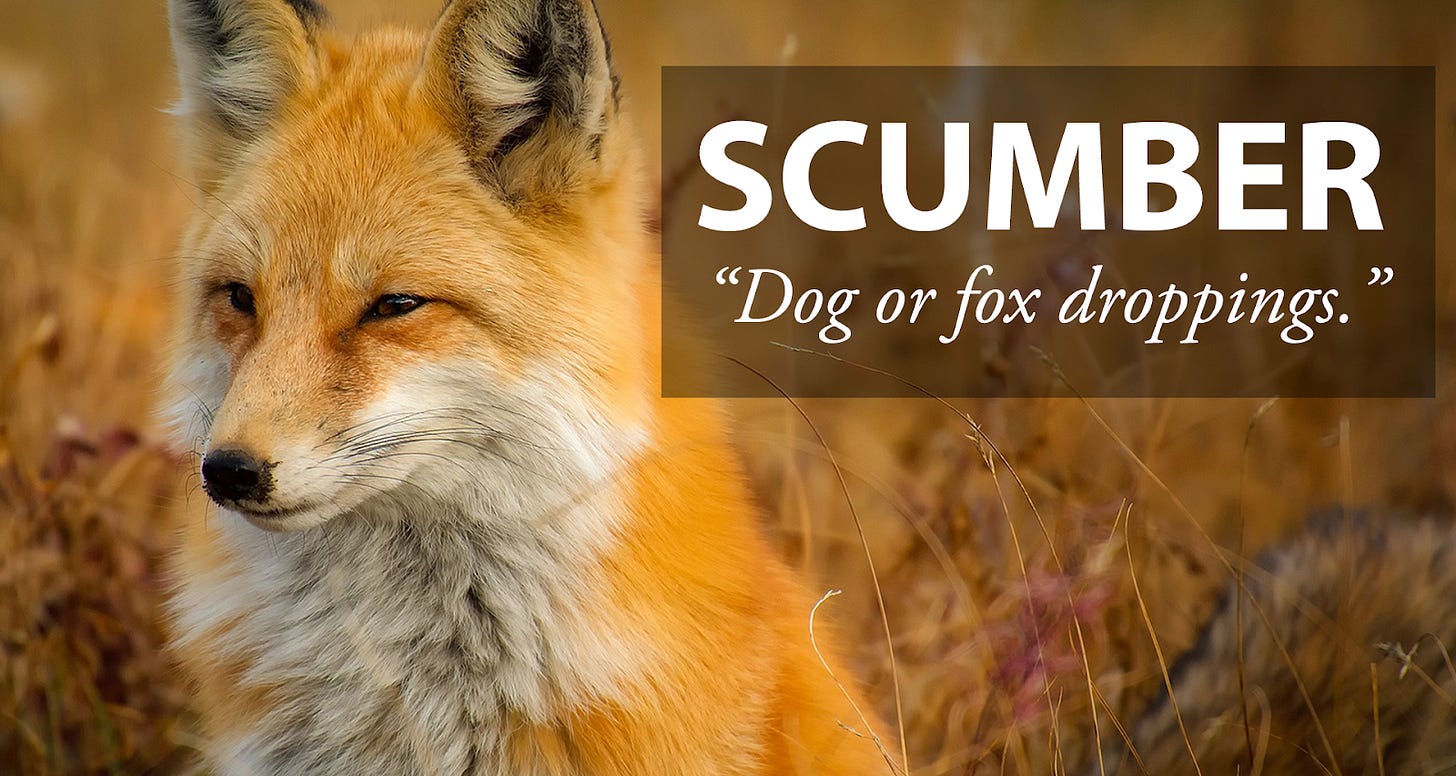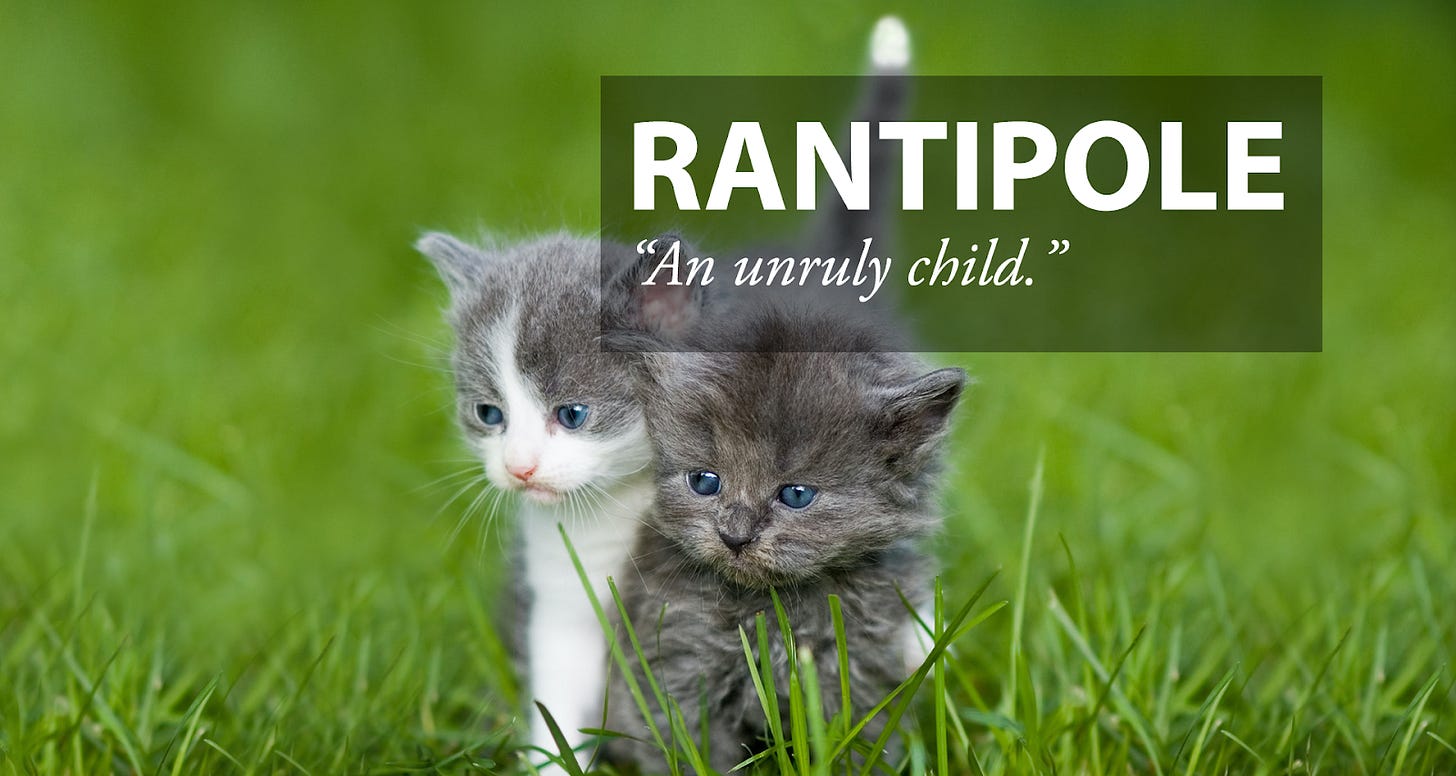8 Lovely Swear Words and Insults We Should Never Have Stopped Using
The rantallions and jobbernowls who let these genuinely delightful words fall out of favor have a lot to answer for!
No puzzle from me this time because the week got away from me, but here’s a lovely one from Liari on MyCrossword. My crash course on how to do cryptic puzzles begins here.
We aim to be useful as well as informative here at On Words and Up Words, so this week I want to provide a service: Some lovely forgotten swear words and insults that will be immediately handy in your day-to-day life without (probably) getting you in trouble with your scumberheaded smatchet of a boss.
“Scumber” is the droppings of a dog or a fox. It also has a verbal form that can be extended to humans in a jocular fashion, as in this classic witticism from “Choyce Drollery: Songs and Sonnets,” printed in 1656:
Beware of fire when you scumber,
Though to sh... fire were a wonder,
Yet lightning oft succeeds the thunder,
Which nobody can deny.
Likely borrowed from the Middle French word jobard, meaning “an extremely credulous person” and combined with the Old English hnol, meaning “head” (same root as we get “knoll” from, as in “hilltop”), a jobbernowl is a jackass, a chucklehead, a twerp, or—as the Scots might say—a numpty.
Jobbernowls can often be spotted in the wild, making long, self-righteous threads on Twitter explicating topical issues they’ve just Googled.
Next time you feel an urge to express a vulgarity, relieve yourself instead with a hearty “Bejabbers!” This 19th century, usually Irish, expletive is a corruption of “By Jesus” that can also rather charmingly be rendered as “By Japers!”
I can assure you from personal experience that your social circle will finally begin to respect you if you start exclaiming “Bejabbers” when you’re surprised or aggrieved instead of effing and blinding like usual.
“Thunderation” is a mostly 19th century American expletive that can be very conveniently substituted for “heck” any time you feel compelled to deploy what Spock memorably calls “a colorful metaphor.” As in “Why in thunderation is my Twitter feed full of all these jobbernowls!”
Francis Grose’s truly wonderful 1811 “Dictionary of the Vulgar Tongue,” which I wrote a bit about in my history of swearing, defines a “Rantallion” very helpfully, thus:
One whose scrotum is so relaxed as to be longer than his penis, i.e. whose shot pouch is longer than the barrel of his piece.
It’s a useful pejorative for those times when you want to wound someone with some real specificity, rather than just yelling “scumberhead” at them and calling it a day.
“Grumbletonian” is a 17th century word for “grumbler,” as you might expect, though I want to start a movement in favor of using it as an adjective, as in “I’m feeling rather grumbletonian today, so please give me space.”
The word originated as a specific designation for members of “The Country Party,” an English political group that claimed to put their love of country above partisan concerns—a posture that was evidently as annoying then as it is today, hence “Grumbletonians.” And the connection to politics meant that early uses of “grumbletonian” had a moralizing element, as in Dryden’s Amphitryon, when Mercury says to his brother Phoebus:
No more of your grumbletonian morals, brother; there's preferment coming.
But by the late 18th century, “grumbletonian” had shed that part of its meaning and was used for curmudgeons and grumps of all stripes, as in this passage from Oliver Goldsmith’s She Stoops to Conquer:
Father-in-law has been calling me whelp and hound this half year. Now, if I pleased, I could be so revenged upon the old grumbletonian. But then I’m afraid—afraid of what? I shall soon be worth fifteen hundred a year, and let him frighten me out of THAT if he can.
This lovely little barb also makes its way into Grose’s dictionary, which defines it as “a rude romping boy or girl,” so it’s a perfect word if you happen to be the grumbletonian in your neighborhood who won’t hesitate to shake a fist at the ill-mannered rantipoles on your lawn.
The Oxford English Dictionary dates “Rantipole” as early as 1652, where it’s used not just for kids, but for anyone who behaves in a disorderly manner, somewhat unhelpfully comparing it to the cognate words “Doddypoll” and “Noddypoll” (fools), as well as “Frampold,” meaning “peevish.” The 1652 reference is to “Merchants’ Wives,” who are evidently “very rantipoll, proud, and imperious over their Husbands.”
A “Smatchet” is a nobody; a lightweight; a nullity; a nonentity. It’s originally a Scottish word (dating back to the 1580s) of uncertain origin, but it’s a genuine delight to say—or, if you’re in the mood—to shout at someone. Next time some rantipole jobbernowl calls you a grumbletonian, don’t take it lying down, bejabbers, but tell them they’re a smatchet and ask them what in thunderation they intend to do about it!












Thunderation is at very least still used by some rural southerners (sample size: my grandparents). It’s a good replacement for Tarnation when you really want to up the ante.
This is super fun. Thank you! I want to bring back smatchet and grumbletonian very much. I shared this post in my weekly roundup of links at Strong Sense of Place. I hope it sends some new subscribers your way! https://strongsenseofplace.com/endnotes/2023/04/07/easter-peeps-and-more-endnotes-07april2023/